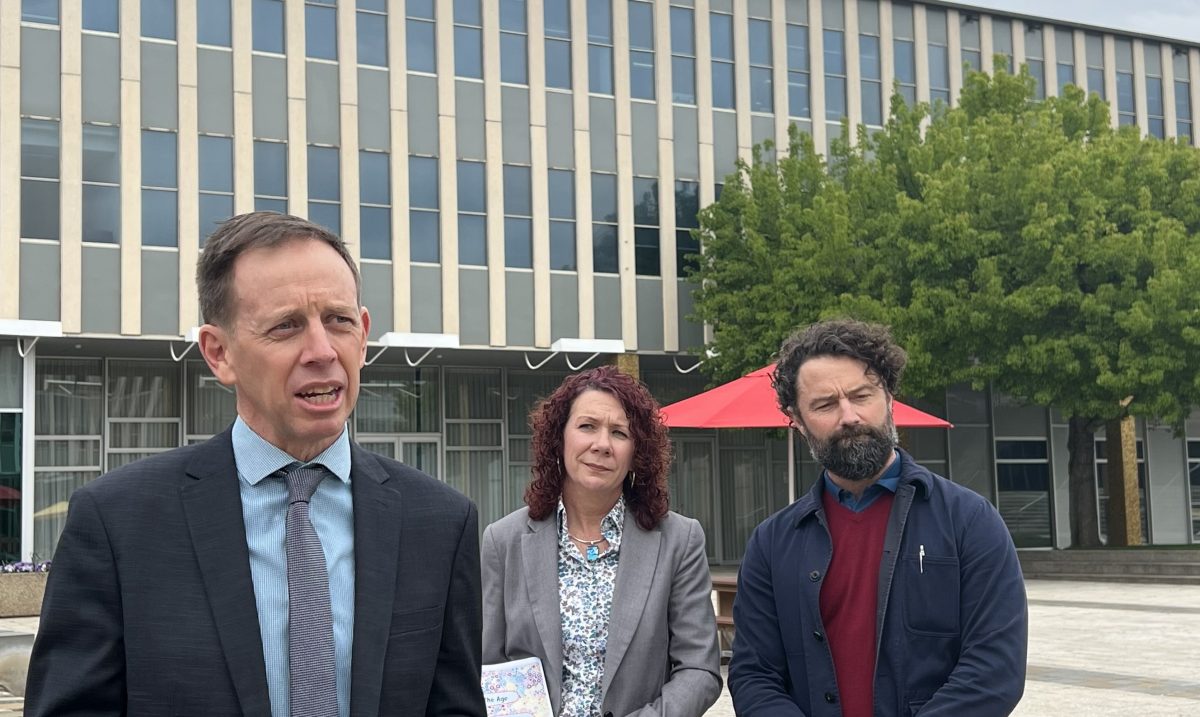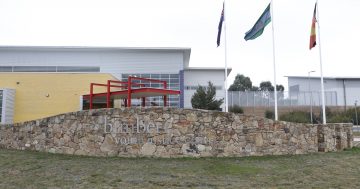
Attorney-General Shane Rattenbury, ACT Public Advocate and Children and Young People Commissioner Jodie Griffiths-Cook and Executive Director of the Youth Coalition of the ACT Dr Justin Barker are among those voices advocating for raising the age of criminal responsibility. Photo: Lottie Twyford.
The ACT will likely become the first jurisdiction in the country to raise the age of criminal responsibility to 12 in the next few months, with a later increase to 14 to follow two years later.
Attorney-General Shane Rattenbury wouldn’t be drawn on providing an exact timeline for the introduction of the long-talked-about legislation, but he said it would either be this year or in the first quarter of next year.
He said there had not been delays to the bill.
The legislation is now being drafted, Mr Rattenbury confirmed, and consultation with the community and service providers would continue.
The age of criminal responsibility in the Territory – as it is in the rest of the country – is 10. ACT Policing have supported raising the age to 12 but previously said 14 is too high.
Other states are considering raising the age to 12, not to 14.
It has long been the ACT Greens’ policy position for the age of criminal responsibility to be raised to 14 and it was an election promise in 2020 to do so.
According to the Attorney-General, the government still intends to raise it to 14 but will do so in a staggered manner, with 12 coming into effect next year and another lift to 14 two years down the track.
Mr Rattenbury said this was because the number of 10 to 12-year-olds in the criminal justice system in the Territory was very low and the existing support system was able to manage that.
He said the cohort of 13 to 14-year-old offenders was larger, and support services would need to be strengthened to meet an uptick in demand.
“It’s not a large group [of offenders], but it is a greater number,” Mr Rattenbury clarified.
“We do need to do the work to ensure the service system is ready.”
The legislation to raise the age of criminal responsibility is being worked on by Mr Rattenbury, the Minister for Children, Youth and Families, Rachel Stephen-Smith, and the Minister for Mental Health, Emma Davidson.
“It is both a legal policy issue but also an important matter of service delivery and response to make sure we provide the right support for young people,” Mr Rattenbury said.
“When a young person gets in trouble, it’s often the result of trauma earlier in their life. They reach a fork in the road, and we have to make a decision about which one they go down.”
Mr Rattenbury said the evidence showed that going down the path of entering the criminal justice system often led to those young people remaining in it.
“The other pathway is for the government to respond by providing support … to help that young person put their life back on track and to address issues of alcohol and other drugs and mental health.”
In the next few weeks, the ACT Government will release a position paper on the topic. This will outline in more detail where it intends to go with this policy and what will change in relation to the wraparound support services available to young people.
Community advocates have long been calling for the age to be raised.
Ms Griffiths-Cook and Dr Barker formally presented a petition signed by almost 5000 people to raise the age to 14 to the Territory government earlier this week (21 September).
Dr Barker said the large petition added to the growing sentiment of the community that raising the age is the right thing to do.
“It demonstrates the community understands the benefit of doing this in the ACT to create a safer community. The evidence is clear,” he said.
“It helps pave the way for the ACT to be one of the leading jurisdictions in Australia.”





















